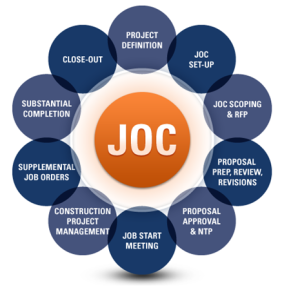
As a Contractor bidding a Job Order Contract, JOC, or a SABER, are you putting your best foot forward?
Here’s a quick – CHECKLIST FOR BIDDING A JOC OR SABER OPPORTUNITY:
Locate and track the opportunity at FBO.gov. List your firm as an interested vendor.
Determine the requirements of the opportunity. Read the solicitation well, as it is important to have a good understanding of this or any opportunity. Remember when you win, you will have to live by your decision and what is in your proposal for up to five years. Here are some questions to consider:
- What are your NAICS codes?
- How long is the contract (3-5 years)?
- Where will the work be performed?
- What makes up the pricing?
- How many coefficients are required to bid?
- How many contracts will they award (1-5)?
- What is the history for the past contracts and contractors?
- Will they have funding?
- Historically have they had funding?
- What are your required mobilization and manning costs to win this contract?
Put together your “A” team for the opportunity: operations, sales/business development, and marketing. You may consider partnering: Subcontractors, Joint Ventures, Mentor Protégé, or a Teaming Agreement.
Ensure your business or your teaming arrangement meets solicitation requirements, business location, and restrictions (HUBZone, 8(a), woman-owned, small business subcontractors).
Make sure you have the right software tools in place. Project management and estimating software are extremely important, but most solicitations require many more software titles.
Assure you have the correct and most current RSMeans cost data. There are several titles to choose from and some contracts require more than one title.
Properly build out and create audit-able line item estimates for the sample project. Estimates include line items, line item modifiers, notes, and takeoffs. Be sure to apply the appropriate local city cost index as per contract. A full and detailed understanding of the scope of work and specifications are essential for a successful proposal.
Evaluate costs for mobilization, demobilization, and execution. The word execution is huge; what is the contract requirement for the size of your local team to execute the contract?
Build your coefficients carefully. Take into account the weighting factors and predicted balance for each coefficient. Be aware of line items or sections excluded from Unit Price Books (UPBs). The items that are excluded from the price book may not be used in estimates. Therefore, these line items may need to be included in your coefficient. This is often the case for portions of Division 01 when using RSMeans for the UPBs.
Assemble your best past performance.
Consider your office staffing requirements.
Consider any state tax obligation. This tax may be difficult to find, but it is required.
Take advantage of asking and reviewing the questions and answers (Q&As). Be sure to read the FBO site often and check for addendums. All old and new contract information must be considered, including Q&As. Remember some RFPs have a drop dead date to ask questions. You want all your questions answered before you turn in your final proposal.
Attend the Pre-Proposal Conference and Site Visit (for the Sample Project) if there is one; you can gain valuable information.
Have others on your team review your proposal for content, grammar, and format. Review available files and bid packages (attachments, solicitations, amendments, etc.).
Ensure you understand and meet every requirement of all sections, especially Section L, Proposal Preparation, and Section M, Evaluation Factors. This may maximize your score by covering every evaluation item.

